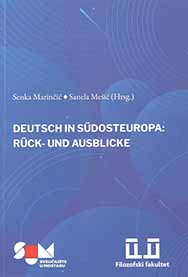Deutsche Sprache heute, ihre Stellung, Relevanz und Perspektive im südosteuropäischen Raum - aus kroatischer Sicht
The German language today, its position, relevance and perspective in south-eastern Europe - from a Croatian perspective
Author(s): Tomislav Krpan
Subject(s): Language studies, Foreign languages learning, Regional Geography
Published by: Filozofski fakultet Sveučilišta u Mostaru
Keywords: German language; present day; position and relevance; South-eastern Europe; Croatian perspective;
Summary/Abstract: German is taught all over the world and is one of the world’s major languages, but in today’s globalized world, its prevalence and meaning are significantly falling behind other languages, primarily English and Spanish. Where is German spoken and taught today at all, what is the position of German in the world, in Europe, in the EU? The proximity of Croatia, as well as the countries of south-eastern Europe, in relation to the German-speaking countries, as well as the developed economic, political, cultural and scientific relations with these countries, makes the German language one of the most important foreign languages. Despite the dominance of English, German is still taught in schools and colleges in southeast European countries. German is one of the most important European business languages and as such could become a bridge between central and south-eastern Europe. The paper deals with the presence, meaning and learning of German in the world, as well as its role and further prospects on the territory of south-east European countries. The focus of our research is the analysis of the position, presence and learning of the German language as a foreign language in Croatia, with particular emphasis on tourism. The research was based on the example of the presence and learning of German as a foreign language in Zadar County.
Book: DEUTSCH IN SÜDOSTEUROPA: RÜCK- UND AUSBLICKE
- Page Range: 114-136
- Page Count: 23
- Publication Year: 2020
- Language: German
- Content File-PDF

